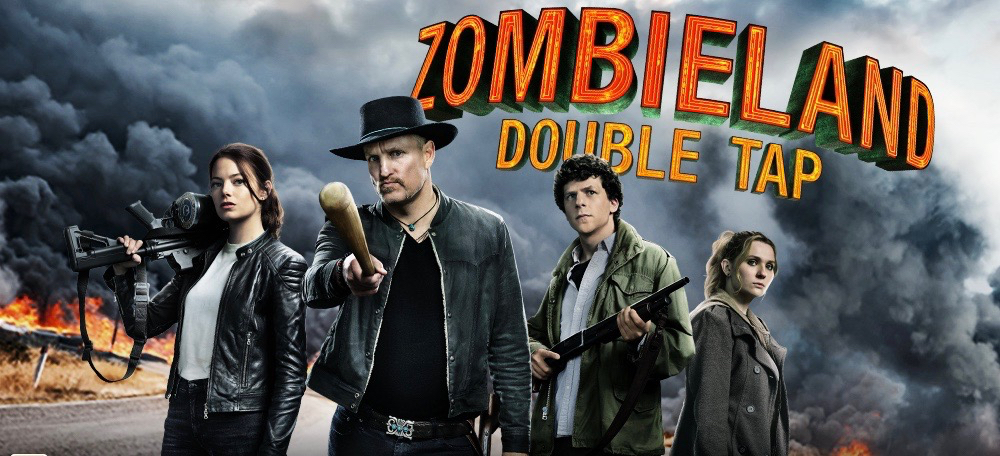As an avid fan of the original “Zombieland,” I was highly anticipating the release of “Zombieland: Double Tap.” Because of the first movie’s charm, its satire on the zombie genre, its simple but poignant plot and most importantly, its funny jokes, one would think that its sequel would at least share some of those qualities, if not all. Well, I’m sorry to say — it doesn’t.
The core cast from the first film remains intact: Jesse Eisenberg as the geeky but lovable Columbus, Emma Stone and Abigail Breslin as the independent survivalists Wichita and Little Rock and Woody Harrelson, who dusts off his old cowboy boots as Tallahassee, the gruff, callous father figure of the group. The fact that this movie takes inspiration from its predecessor’s character development is not necessarily a bad thing, but “Zombieland: Double Tap” works to reiterate themes from the first movie at a greater frequency without any sort of progression or subtlety. It was frustrating to see these characters go through the exact same journey to reach the very same conclusion, which begs the question: why was this movie made?
Speaking of the journey, the plot revolves around Little Rock, who’s experiencing the inevitable desire to be around people her age as a young adult. In meeting a person on the road with her sister, she decides to run away from her newfound family and home. The remaining three tenuously team up to bring her back, running into a gaggle of similar survivors. This is where the movie succeeds — it pads its short runtime with funny cameos and ancillary characters.
The new characters that showed a rather outstanding performance included the empty-headed Madison (Zoey Deutch) and Albuquerque (Luke Wilson), who does his best to spoof Tallahassee. The chemistry between the main cast is given a much-needed jolt with the introduction of these characters that essentially alter how the core four interact with each other. Madison acts as a wrench in Columbus and Wichita’s relationship, which has been strained already by circumstances that I have deemed spoiler territory. If they had to solely mend the rift created at the beginning of the movie, any conflict would have seemed forced as Wichita’s decision to return to Columbus was wholly transparent.
Sadly, that is where the positives to this movie end, because by far the most important thing about comedies is where this movie falls flat: its humor. I do not understand how the writing team from the first film could not write fresher jokes. Their take on the zombie genre in the first film seemed rather novel in 2009. But, in 2019, those same jokes have come to be stale which isn’t helped by the fact that several recurring gags in this movie are recycled from the first one. And the new gags, of which there are few, are so boring and nonsensical that they actually seem to halt the movie’s plot. Whenever this movie would cut to a “Kill of the Year” contender snippet, I would first ask myself how they came to learn about this event, and why the bit was five agonizing minutes long. The movie frequently returns to Columbus’ rules for an easy joke, which again felt fresh and new… 10 years ago. To reach down into that well as many times as they did in this movie will leave most audience members loathing the next time they have to hear a joke about Eisenberg doing cardio.
All in all, “Zombieland: Double Tap” is a movie that has no imprint on any level. The box office will forget this movie in a week; you will forget this movie in the same time, which is incredibly disappointing having loved the first movie for a decade. That being said, this movie is inoffensive to taste. If you desperately want to watch a movie that you don’t have to think about with a couple friends, you won’t hate yourself for watching this one. Maybe.
SCORE: 4/10


















This film was an unparalleled masterpiece. I adored Zack Snyder’s vision in bringing together the ensemble and incredible diverse cast to deliver one of the most poignant, heart wrenching tales since FRIENDS. More enthralling than Interstellar and better written than 12 Angry Men. James Dean really outdid himself this time
In conclusion, I agree with your 4/10 review
Thought it was great